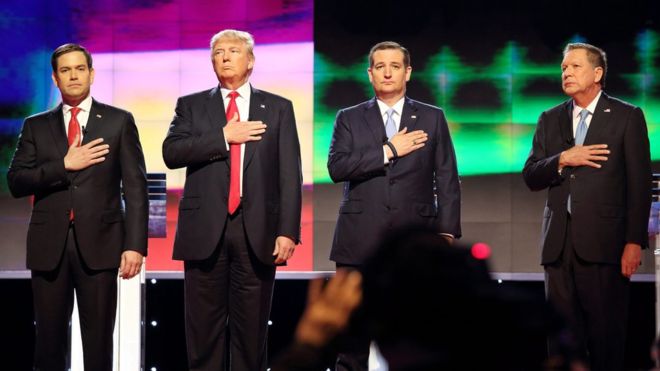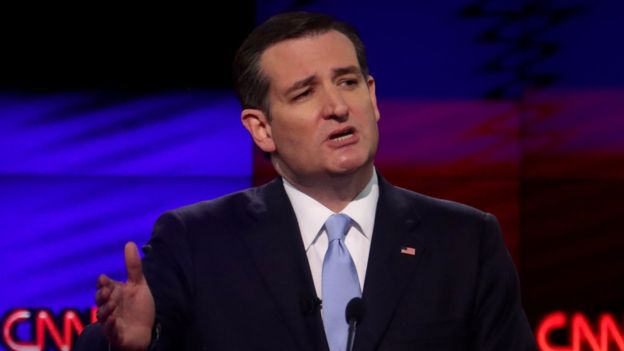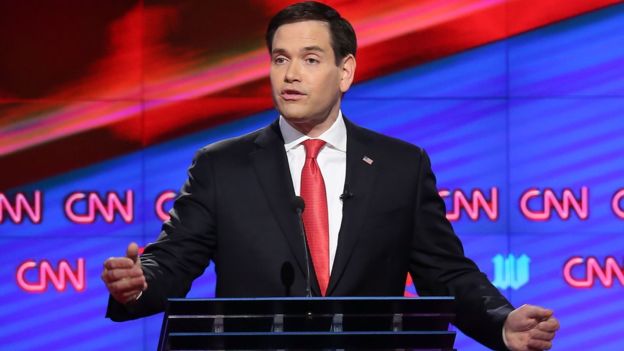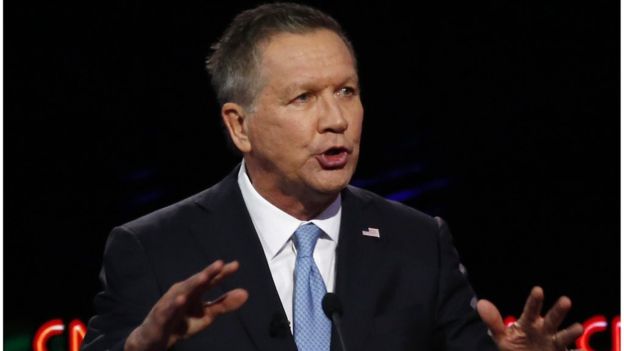Republican debate: Civility breaks out as restrained Trump eyes victory
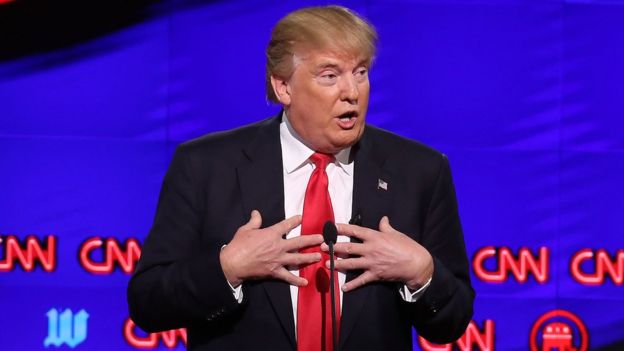
This is how the Republican debate season ends. Not with a bang, but with civil disagreements — even when the topic is the acceptability of sweeping anti-Muslim rhetoric, condoning violence at political rallies or the use of torture and assassination as foreign policy tools.
Technically there still could be one debate on the schedule, in 11 days, but by then Donald Trump may have a near insurmountable lead in the race for the Republican nomination. This was the chance for the three remaining competitors to make a last, desperate run against the front-runner, and they opted for restraint.
Because of that, there can only be one winner in tonight's proceedings.
Donald Trump — winning
The New York billionaire was once again exposed as having only a superficial handle on many issues.
His solution to the long-term viability of the Social Security retirement programme was to rail against that tired hobby horse "waste, fraud and abuse". When pressed on the implications of his threat of a massive tariff on Chinese goods (which would never survive a World Trade Organisation challenge, of course), he said he was only using it as a "threat". His answer to what he called bad deals with Iran and Cuba was simply to negotiate better deals.
He was also forced to talk about some of his more controversial views, such as his description of Islam as a religion that "hates us" and his willingness to use waterboarding as an interrogation technique and target the families of Islamic militants. But he was largely able to shrug the criticisms off.
"It would be very easy for me to say something different, and people would say isn't that wonderful," he said about his views on Islam, "but we better solve that problem before it's too late."
When he was asked about the violence that has occurred in some of his rallies, he said it was, in effect, at the instigation of unruly protesters. None of his opponents challenged his answer, however.
Mr Trump's obvious goal coming in to this debate was to present a more restrained, "presidential" face to the American public — and he largely accomplished the task. He took a few swipes at his opponents when pressed, but the disruptive, boorish Trump of past debates was mostly missing.
In his opening and closing statements Mr Trump made the case to Republicans that he was expanding the party and bringing in millions of new voters who would carry them to victory. Those voters aren't interested in hearing the New Yorker talk in detail about his Cuba policy or his views on climate change. They support him because he's railing against a system they see as fundamentally broken, which he did once again on Thursday night.
Ted Cruz — surviving
The Texas senator is playing the hand he's been dealt. He's the candidate for conservative true-believers and evangelicals who aren't so angry at the political system that they're willing to join Mr Trump's movement.
It's probably a second-place strategy, but in the event that Mr Trump can't seal the nomination by winning a majority of delegates, Mr Cruz could be in position to make the case that he is the nominee who could bridge the gap between the angry grass-roots and a Republican Party establishment that abhors the idea of Mr Trump as its standard bearer.
When Mr Cruz did go after the front-runner, it was mostly in the context of his not being ideologically pure.
"If you're fed up with Washington, the question you should be asking is who is willing to take on Washington?" Cruz asked, noting several times that Mr Trump had donated money to John Kerry and Hillary Clinton.
Mr Cruz has the money and the support to see this campaign to the end, and he seems happy to wait and try his luck at a one-on-one face-off with Mr Trump.
Marco Rubio — heading for the exit
By all accounts the Florida senator had a strong debate performance. He displayed a firm grasp of policy that was skilfully explained in layman's terms and managed to sternly rebuke Mr Trump on his anti-Islamic views.
"I'm not interested in being politically correct. I'm interested in being correct," he said after the New Yorker stood by his harsh view of the Islamic faith. "We are going to have to work with people of the Muslim faith even as Islam itself faces a serious crisis within it of radicalisation.
The problem for Mr Rubio is that his last debate performance and the days on the campaign trail after it cast a long shadow over his evening's performance. His attempt to defeat Mr Trump by launching a tirade of belittling barbs has now defined his campaign, and in a political season where authenticity is valued above all, Mr Rubio's drastic changes in tactics diminish their effectiveness.
His attempt to roll in the mud with Mr Trump are likely to blame for his precipitous drop in the polls, and he could be on the verge of losing his home state and leaving the race.
Thursday night's performance, at least, will allow him to exit with some measure of dignity.
John Kasich — fading fast
The Ohio governor's strategy of taking the political high road shines when his opponents are all racing to the bottom. When everyone tries to be civil, however, it leaves little room for Mr Kasich to distinguish himself — and he largely disappeared into the scenery over the course of the debate.
He did have several opportunities to boast about his successes in his home state, which holds its winner-take-all primary on Tuesday. At this point, his only hope is that Ohio voters appreciate the attention from their native son and give him his first win of the campaign.
Thursday's proceedings didn't give the candidate much to build on after that, however.
Политика конфиденциальности | Правила пользования сайтом
